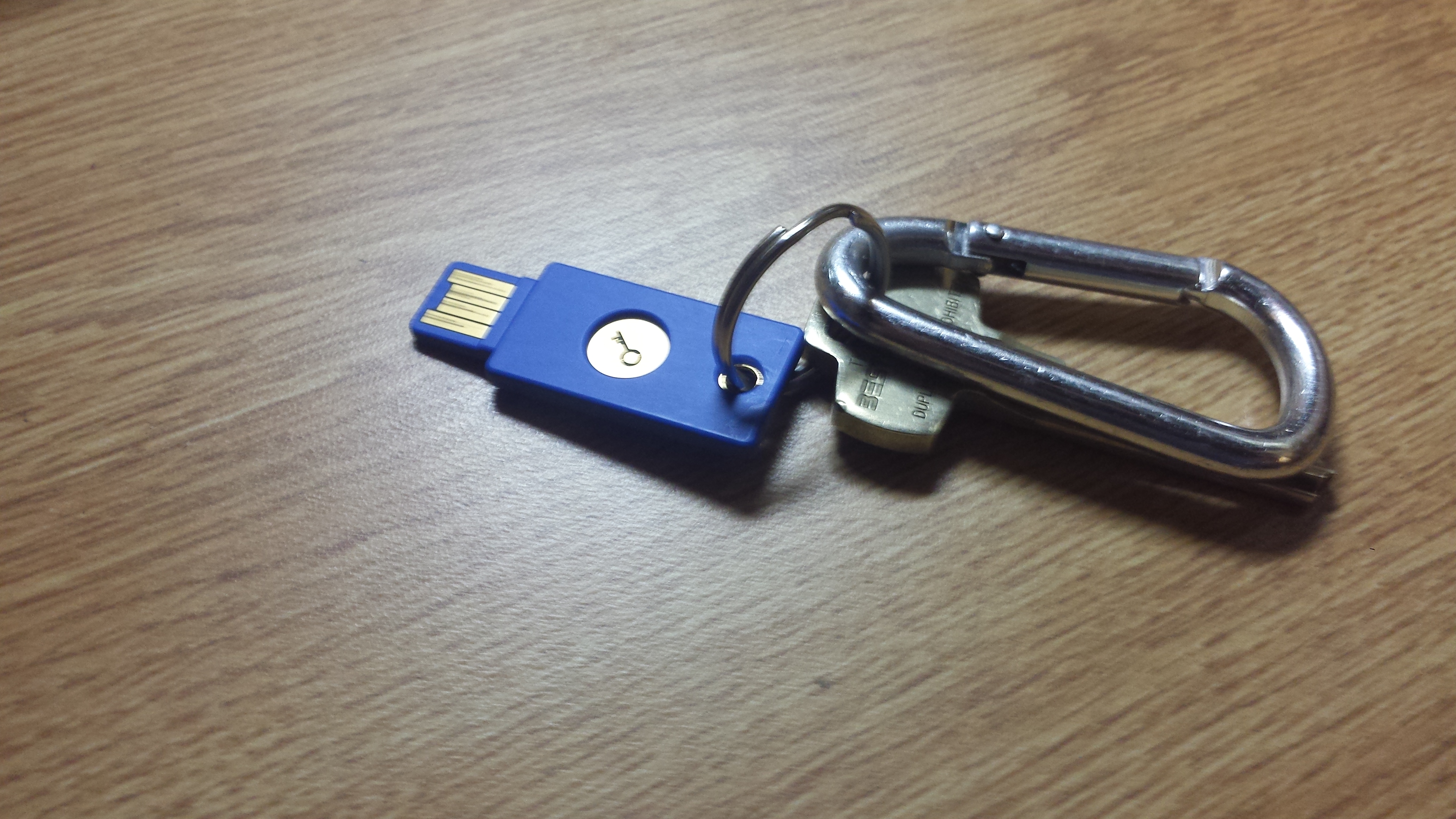Physical Computer Key
2016-04-05
U2F
I recently ran across a 2-factor authentification protocol called U2F. It was developed by Yubico and Google and manifests itself as a physical usb 'key' that communicates its identity using Public-key cryptography. My key was $18, but I bought two so $36 (I'll explain why), has no battery, fits on my keychain, and the spec and source code are online. Check it out. U2F can be used by websites that implement the protocol as long as you're running Google Chrome. The current websites at the time of writing that support U2F as a mode of 2-factor authentification include, Google, Dropbox, Github, and more. I also use it as a 2nd auth for my OS. I use Ubuntu 15.10, so that is what the following guide assumes you want to do as well.

On the Web
Once you get your U2F key(s), to use them on the web, all you need to do is add a udev rule for them. This should do the trick:
sudo wget -O /etc/udev/rules.d/70-u2f.rules https://raw.githubusercontent.com/Yubico/libu2f-host/master/70-u2f.rules
Now you can either restart udev or restart your computer.
Now plug the key in and follow the compatible website's instructions to set it up.:boom:
On the Desktop
Setting up U2F on the desktop is a teeny bit more complicated than for web,
especially because Ubuntu 15.10 doesn't have an official apt package yet.
:frowning: Disclaimer: You can permantently lock your OS if you f this up.
Backups are always a good idea. Don't worry though, I didn't break anything, so read on.
Download the sources from Github:
git clone git://github.com/Yubico/pam-u2f.git
Install some dependencies:
apt-get install autoconf automake libtool libpam-dev asciidoc xsltproc libxml2-utils docbook-xml --no-install-recommends
Run these build commands:
autoreconf --install
./configure --with-pam-dir=/etc/x86_64-linux-gnu/security/
make check
make install
This should have built the sources and copied a pam_u2f.so file to that
/lib/x86_64-linux-gnu/security/ directory.
Next we are going to add a line to /etc/pam.d/common-auth that allows either the U2F key
or your password to unlock the computer. This way you can test to make sure
your key(s) work before locking yourself out of your computer. Add this:
auth sufficient pam_u2f.so debug cue
Time to associate the key with your username. Make a file
~/.yubico/u2f_keys. Run pamu2fcfg -umyusername where myusername is your
account's username. You'll have to press the magic button on the key and the
utility should print out something like:
myusername:oirwuriuvnwboom(Lots of stuff)djlssflj,sfhsfksfkhHexNumber
In the format:
<username>:<KeyHandle>,<UserKey>
If you have multiple keys, run pamu2fcfg for each one and add as such:
<username>:<KeyHandle1>,<UserKey1>:<KeyHandle2>,<UserKey2>
Now reboot your computer, :pray:, and test if the key works by first plugging it in,
then typing your password, then pressing the capacitive
button on the key when it flashes. If it doesn't work or doesn't prompt for the key, do not continue or you'll lock yourself out of your computer. If they key doesn't work you're on your own to fix the installation (jk send me an
email). If it does work, you can change the sufficient in the line we wrote
in /etc/pam.d/common-auth to required. PSA: this can be dangerous, backup first and proceed at
your own risk.
Now, after you type your password, it will be wrong if no key is plugged in. The login should cue you with 'Please touch the device.' when you login and the light on the key should flash. Press the button and you're all set. :clap:
Oh yeah, and it works for sudo as well. Try it out.
Why two?
Because I don't trust myself not to lose the one. I suggest buying a second key, registering and testing it, and storing it in a safe place, like an actual safe. You shouldn't have to ever use the backup key again.
Security
Yes, I know my computer is still vunerable. 2-factor authentification doesn't make your accounts perfectly safe. Especially if your hard drive is unencrypted. The point of the key in my mind is 70% fun and 30% security, but you may feel differently.